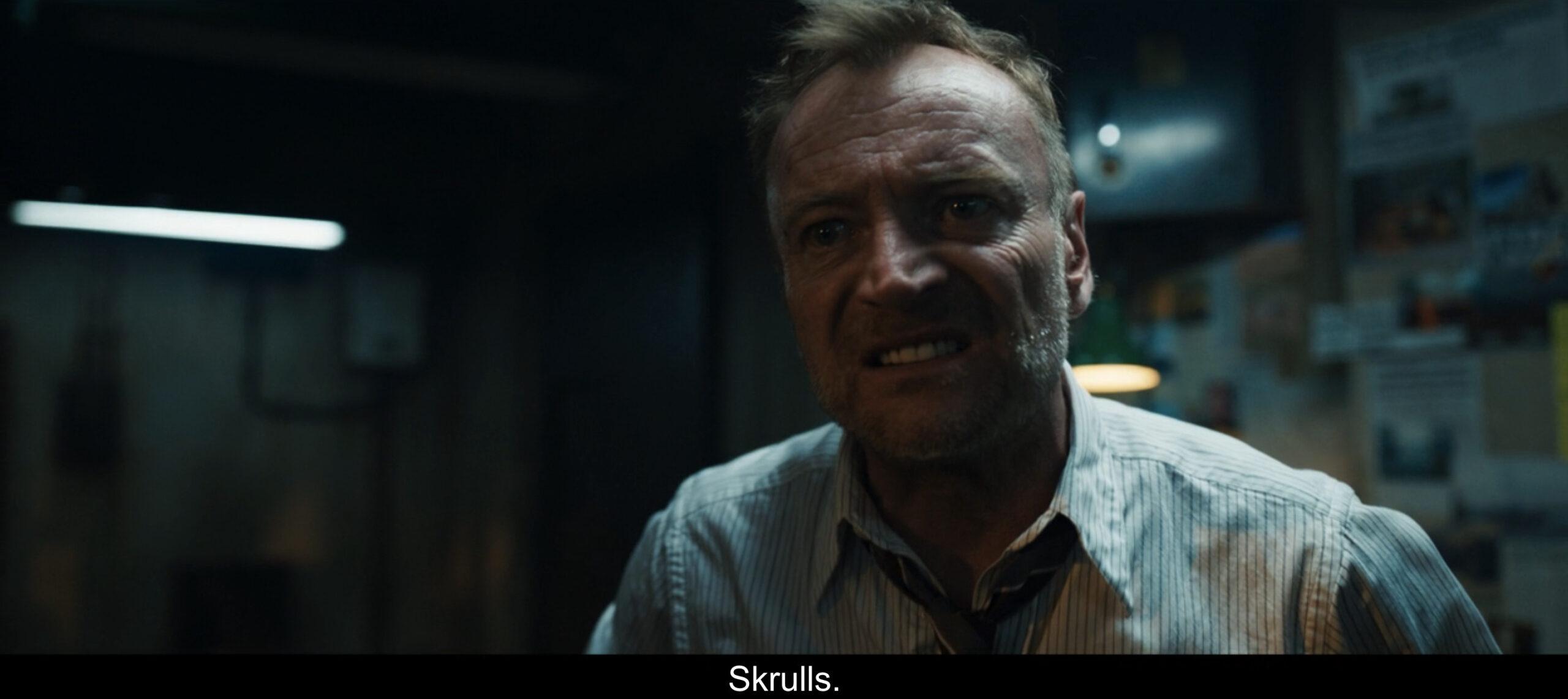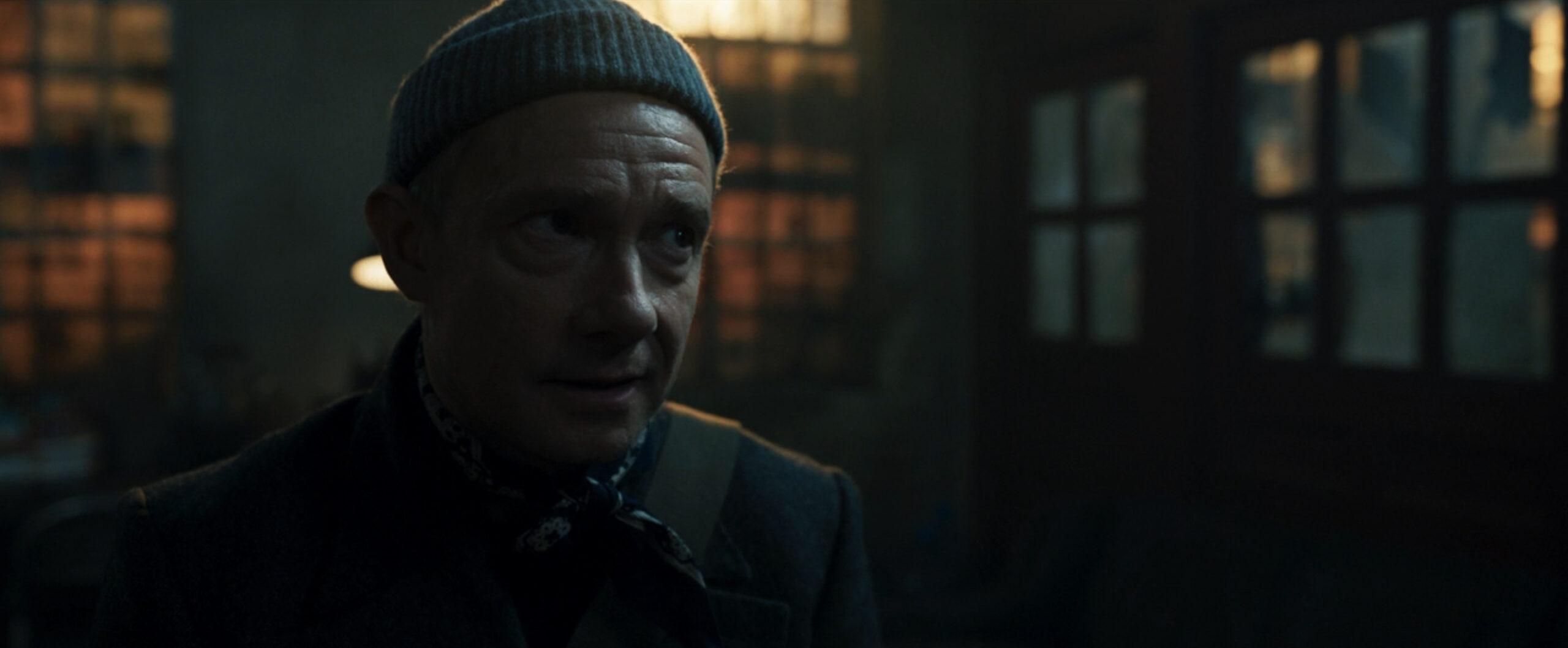
The season premiere of Secret Invasion is bookended by a pair of notable deaths. Despite the heightened stakes that come with the one that closes the episode, neither demise packs as much of a punch as it should. The frenetic events that bridge the gap between them are tied so tightly to the history of the Marvel Cinematic Universe that the series struggles to stand on its own in a shaky debut.
Secret Invasion is the first TV series in Marvel’s Phase 5, and it’s also the first story to center on Nick Fury (Samuel L. Jackson) in all the years since he helped launch the MCU in 2008’s Iron Man. It’s been quite some time since Fury has found himself in the middle of the action—or even on Earth, for that matter. He’s been on the S.A.B.E.R. Space Station, “building up the most complex aerospace defense system in the history of mankind,” as the president of the United States (Dermot Mulroney) describes it. Now that Fury is back, it’s clear that the former director of S.H.I.E.L.D., and one of the world’s foremost spymasters, has lost a step. And just about everyone he sees tells him as much.
But before we get too ahead of ourselves, let’s circle back to the opening sequence of Secret Invasion’s premiere, “Resurrection,” which sets the tone for a series that boils down to a high-stakes game of trust. Before the eerie opening credits, for which the show made the bizarre and disappointing choice to use AI-generated art instead of real artists, the episode begins with Everett K. Ross (Martin Freeman) covertly meeting with Agent Prescod (Richard Dormer). Prescod is one of the many new characters to appear in the 50-minute installment, but he still gets the honor of declaring the looming threat in Secret Invasion:


Although Ross’s reaction to hearing the name of the race of shape-shifting aliens is pretty much the same facial expression that he’s had in roughly 50 percent of his screen time in the Black Panther movies, Prescod surmises that Ross is one of the Skrulls that he’s been obsessively tracking. Dormer’s chaotic snarls while delivering just about every line in this scene make Prescod my MVP for the episode, but as Skrull-Ross tries to leave with evidence of the Skrull resistance’s plot to start a war between the United States and Russia by setting off bombs in Moscow on Unity Day, Prescod attempts to stop him and gets shot in the process. Prescod dies before we get the chance to know him, and it doesn’t seem like there’ll be any resurrections awaiting the fallen agent either. (At least not in this corner of the multiverse.)
It doesn’t take long for former S.H.I.E.L.D. agent Maria Hill (Cobie Smulders) and Skrull general Talos (Ben Mendelsohn) to follow Prescod’s lead in their discovery of the Skrull pretending to be Ross. In dramatic fashion, Talos (disguised as an unnamed Russian guy) chases the other shape-shifter off of a roof to a violent death, which leads into the opening credits. The dual reveal of these two Skrulls posing as humans establishes the challenge ahead for Fury and his allies: distinguishing their friends from the Skrull resistance leader Gravik (Kingsley Ben-Adir) and his followers. But what with Prescod’s gut feeling and the understanding that Secret Invasion wouldn’t kill off a recurring MCU character within the first eight minutes of the episode, the unnamed Skrull’s death doesn’t quite land (pun unintended) as the riveting hook that creator Kyle Bradstreet and director Ali Selim likely intended it to be.
Between the dark tone and talented cast that “Resurrection” introduces, Secret Invasion shows plenty of potential in its opening salvo. But the premiere lacks the proper pacing and thought-provoking exploration of characters and events that are needed to instill much confidence that these seeds will sprout in a six-episode limited series. Even with the luxury of the extra time and space that TV affords, Secret Invasion rushes through so much information to bring its audience up to speed that it hardly takes a moment to allow any individual part to breathe.
Like the Phase 4 shows that featured returning characters from the Infinity Saga, such as WandaVision and The Falcon and the Winter Soldier, Secret Invasion reckons with the trauma induced by Thanos and the so-called Blip. As Hill, Talos, and even MI6 special agent Sonya Falsworth (Olivia Colman) all tell Fury, he hasn’t been the same person since Thanos snapped him out of existence. While I would be pretty messed up too if I suddenly disintegrated, only to return several years later, it isn’t exactly compelling storytelling for Fury to be repeatedly told about that trauma by other characters. Rather than allocating time to dramatize the moment of Fury’s snapture and explore its psychological impact, as both WandaVision and Hawkeye did with their core characters, Secret Invasion reheats a snippet of the stinger shown after the credits of Captain Marvel before carrying on.
Striking the right balance between being connected to a wider cinematic universe and telling a satisfying, self-contained story has always been a difficult challenge for entries in the MCU. But that calculus has grown increasingly complicated as the collective story has expanded, especially when universe-altering incidents like the Blip create narrative ripple effects that are too significant not to address. That tension has become a frequent point of discussion among fans and critics as the Multiverse Saga has attempted to move beyond the climactic events that ended the Infinity Saga, with mixed results. And Secret Invasion relies not only on Infinity War and Endgame, but on every previous appearance from Fury, Hill, and the Skrulls, especially in Captain Marvel. (To a lesser extent, that also applies to Don Cheadle’s James Rhodes, who appears in a single throwaway scene to establish his close relationship with the American president.)
The motive for Gravik’s Skrull rebellion stems from the promise that Fury made to Talos and his group of Skrulls in Captain Marvel to help find them a new home, following the destruction of their home planet, Skrullos, and Fury hasn’t been able to deliver in 30 years. (We still don’t know why.) As Fury’s longtime friend, Talos has taken on a share of that blame, and he has been shunned by the other Skrulls—including his daughter, G’iah (Emilia Clarke)—as a result of his allegiance and shared failures. G’iah shows signs of being morally conflicted by the resistance’s extremist methods, but she does just enough to misdirect Fury, Talos, and Hill so that they fail to prevent the bombs from exploding on Unity Day.
Perhaps the most illuminating way that Secret Invasion shows its overreliance on the MCU’s past is in the momentous death of a character at the end of the premiere—or rather, the death that should have been momentous.
Maria Hill, the former agent of S.H.I.E.L.D., has been a constant in the MCU ever since 2012’s The Avengers, almost always standing loyally by Fury’s side. With little screen time through half a dozen big-screen appearances, plus several more in ABC’s Agents of S.H.I.E.L.D., Hill has been an underrated—and mostly underserved—character who finally seemed to be taking on a more prominent role in Secret Invasion. Alas, Gravik disguises himself as Fury and shoots her. Hill’s last moments are again spent in service of Fury’s character. It’d be one thing if Secret Invasion worked its way up to what could have been a major moment, but here her death is nothing more than a plot device that supplies the protagonist with the motivation he needs to step up to the challenge at hand.
“Resurrection” is only the first episode of the season, so there’s more than enough time for Secret Invasion to reveal a few more tricks up its sleeve. (We’ve previously seen Hill and Fury successfully deceive their enemies and allies alike by feigning death after Fury was shot in Captain America: The Winter Soldier, so there’s always the chance that this won’t be the last we see of Maria Hill.) With so many narrative threads being pulled at once in the premiere, though, the series needs to just slow down and focus on them individually. That goes for its examination of characters like Gravik, whose menacing presence shows glimpses of a compelling antagonist, and even Fury, who feels like a spectator in his own story so far. Hill’s unceremonious death is not the strongest foundation for this season to build on, but if it doesn’t kick-start the series into something more captivating, I’m not sure that anything will.

